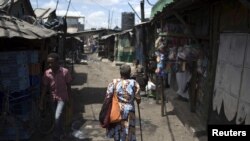The coronavirus pandemic has wiped out an estimated 2 million jobs in Kenya, forcing many into the informal economy. Kenyans, however, also have a secret that is keeping many of them financially afloat — the largest cooperative savings and loan movement in Africa. With more than 14 million members making monthly contributions, Kenya's cooperatives offer loans during tough times, helping many to ride out the pandemic or even start their own businesses.
Thirty-year-old Judy Muthama was selling shoes and utensils in the Mukuru Kwa Njenga slum in central Nairobi.
Sales were good until the coronavirus pandemic wiped out her business. But, she is restarting her business with a $600 loan from a savings and credit union, where she has had a membership for three years.
Muthama says that if it were not for the cooperative, she would have closed her business. She says it’s a cooperative that improved her situation each time she ran into financial constraints. She says she goes to the cooperative to borrow money so she can continue with the business. Otherwise, Muthama says, she would have been out of business long ago.
Muthuma is one of some 14 million Kenyans who are members of cooperative societies that depend on monthly member contributions to survive.
Austin Oduor is the chairman of Uprising Housing Cooperative, whose savings union has 834 members. Since March, he says the union has seen an 80 percent drop in monthly collections, but is still helping members get through tough economic periods.
“While they appreciate the cooperative, we have worked with them in a number of things. We have given them meal vouchers, hand washes, masks. We gave some of them loans to take their children back to school,” he said.
Kristin Wilcox, the director of a USAID CLEAR program that works closely with the cooperative societies in Kenya, said she admires the initiative that drives the groups.
“By their very nature there is no one from outside assisting these members to achieve their goals. It's purely based on their own energies and own abilities to collectivize," she said. "I think that’s exciting because there is no one, no man behind the curtains, there is no one there at the end of the day to take the bulk of the profit. What they are able to achieve is on their own.”
Isaac Nyamongo, the deputy vice chancellor at the Cooperative University of Kenya and a member of the Kenya Cooperative Coronavirus Response Committee, said they have helped 44,000 people.
“As committee we set up what we call a co-op kit, and in this kit we provided some basic foodstuff for the vulnerable households and within that we also provided masks for prevention," he said. "We also provided within that kit sanitizers and soap. The whole idea was while it was important for us to provide food to the vulnerable households, we also wanted to give them a means with which to prevent an infection.”
The cooperative societies are likely to remain active in coming months. Kenya has eased restrictions which have helped open up the economy, but the increased number of positive coronavirus cases may slow the economic recovery.




